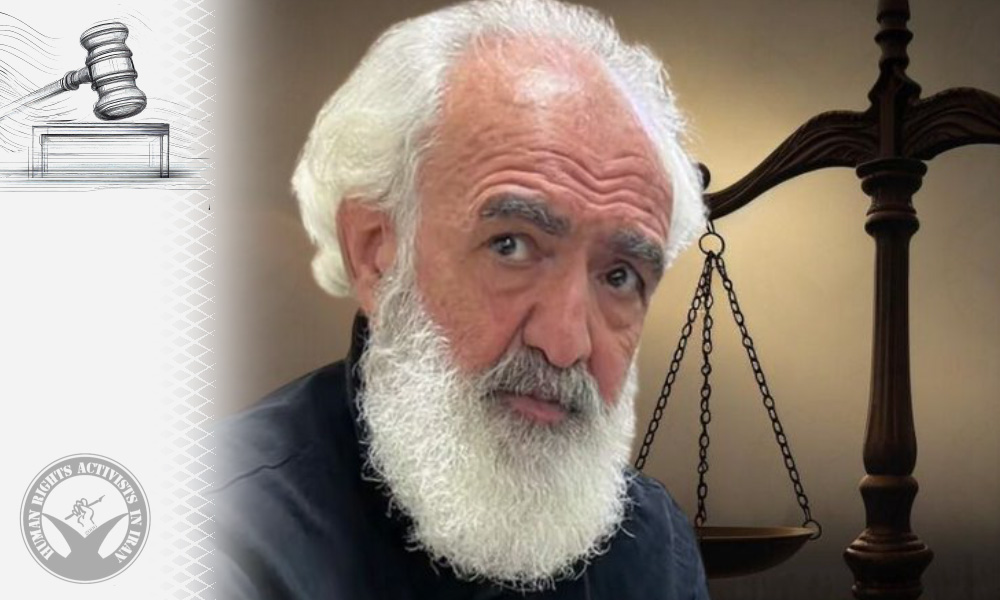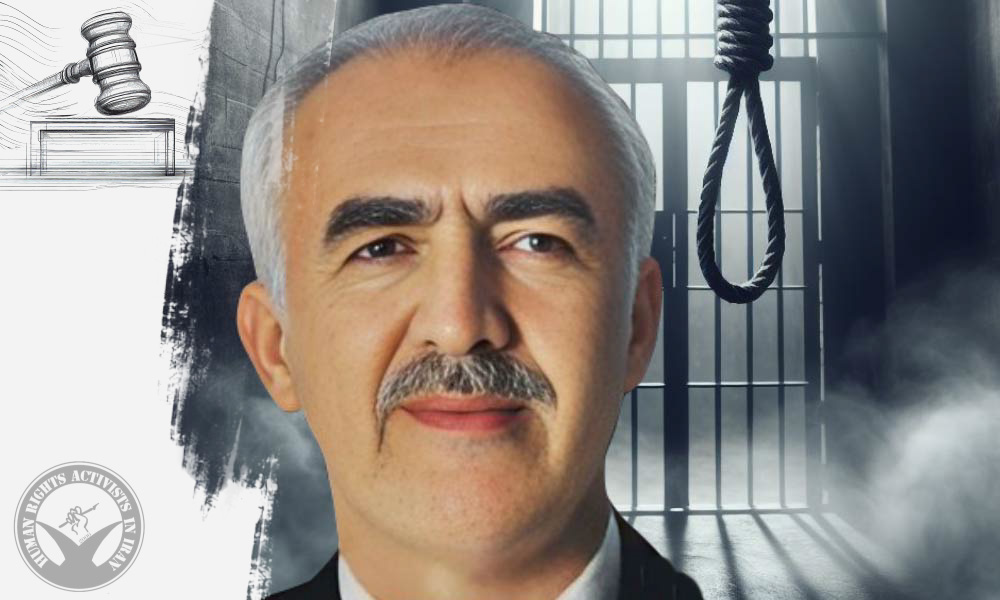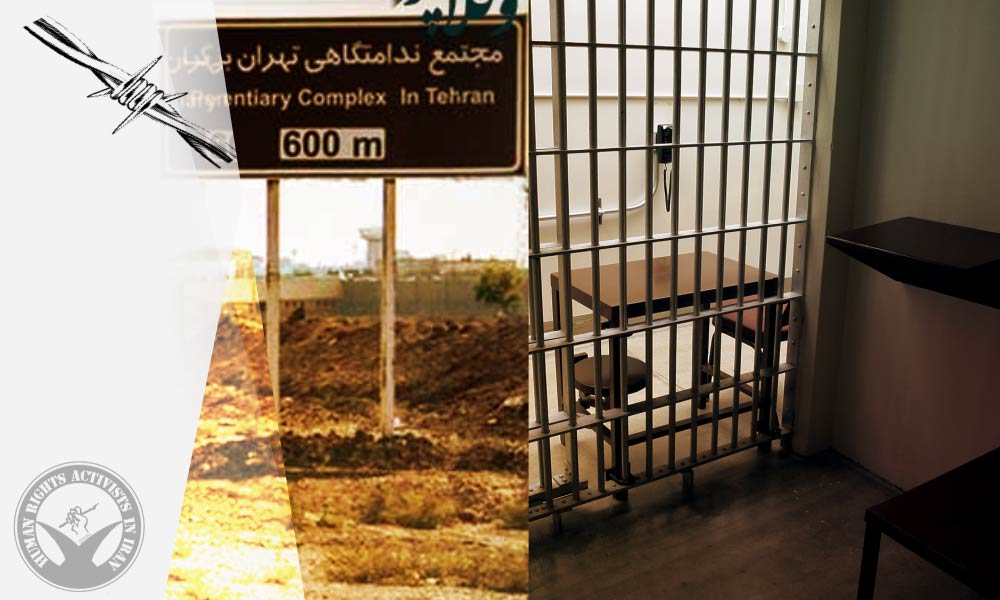HRANA News Agency –Recent investigations by HRANA reveal that at least 54 prisoners across Iran have been sentenced to death on political or security-related charges. The findings show that some of these sentences have been upheld by the Supreme Court and forwarded to execution branches. Of these, at least 24 were sentenced to death by Tehran’s Revolutionary and Criminal Courts, while the remaining 30 are concentrated in provinces such as Khuzestan, Razavi Khorasan, West Azerbaijan, Sistan and Baluchestan, and Kurdistan.
HRANA’s research highlights serious due process violations in many of these cases. Prisoners were frequently denied fair trials, including restricted or outright denial of access to legal representation and a lack of transparency in judicial proceedings. Some were denied access to their chosen attorneys, while in other instances, judicial authorities blocked meetings between prisoners and their lawyers. A significant number of these individuals, who denied the charges against them, were sentenced to death following opaque and unjust trials. Reports further indicate that some of these prisoners are currently held in solitary confinement, awaiting execution.
Investigations show that judges in Tehran courts have issued the majority of death sentences for these prisoners. The main charge against them is cited as “Baghi” (armed rebellion or uprising against the government). Branch 15 of the Tehran Revolutionary Court, presided over by Judge Abolghasem Salavati, and Branch 26, led by Judge Iman Afshari, have played significant roles in issuing these sentences. In Urmia, sentences against prisoners, including porters accused of espionage for Israel, have been issued by Branch 3 of the Urmia Revolutionary Court.
Some death sentences were reissued in equivalent-level courts after being overturned by the Supreme Court. For example, Hatem Özdemir and Abbas (Mojahid) Korkor (Korkori) were resentenced to death in equivalent courts following the annulment of their initial sentences. Similarly, Mohammad Javad Vafaei Sani was sentenced to death for the third time during judicial proceedings.
While certain individuals have been accused of espionage, the Iranian government’s track record of leveraging such charges as a political tool against dissidents raises serious doubts about these allegations. The use of the death penalty in cases shrouded in secrecy and lacking transparency only exacerbates concerns.
Lawyers for some of these prisoners have repeatedly asserted that their clients were sentenced to death in unfair judicial processes that failed to meet fair trial standards. For instance, in the case of Pakhshan Azizi, her lawyers stated that the evidence presented to the Supreme Court demonstrated that she had no involvement in military activities and was solely engaged in humanitarian efforts in refugee camps for those displaced by ISIS. They expressed concern over the potential rushed handling of the case and called for a thorough and fair review of the evidence.
This report focuses on the human consequences of these cases, identifying the names and examining the latest legal statuses of 54 prisoners sentenced to death on political and security-related charges.
1. Varisheh Moradi- Prison: Evin Prison
- Main Charge: Baghi (armed rebellion)
- Court: Branch 15, Tehran Revolutionary Court
- Case Status: Initial death sentence issued
|  |
| Varisheh Moradi was arrested by security forces in the suburbs of Sanandaj on August 1, 2023. She was transferred to the women’s ward of Evin Prison on December 26. In November, 2024, she was sentenced to death by Branch 15 of the Tehran Revolutionary Court, presided over by Judge Abolghasem Salavati, on charges including membership in an opposition group and Baghi. |
2. Pakhshan Azizi- Prison: Evin Prison
- Main Charge: Baghi
- Court: Branch 26, Tehran Revolutionary Court
- Case Status: Death sentence issued and upheld by the Supreme Court
|  |
| Pakhshan Azizi, a resident of Mahabad, was arrested in Tehran on August 4, 2023, and transferred to Ward 209 of Evin Prison. After four months of interrogation, she was moved to the women’s ward. On July 24, 2023, Branch 26 of the Tehran Revolutionary Court, presided over by Judge Iman Afshari, sentenced her to death and four years of imprisonment on charges of Baghi through membership in opposition groups. Her case has been recently upheld by the Supreme Court. |
3. Akbar Daneshvar-Kar- Prison: Evin Prison
- Main Charge: Baghi
- Court: Branch 26, Tehran Revolutionary Court
- Case Status: Initial death sentence issued
|  |
4. Seyed Mohammad Taghavi Sangdehi- Prison: Evin Prison
- Main Charge: Baghi
- Court: Branch 26, Tehran Revolutionary Court
- Case Status: Initial death sentence issued
|  |
5. Babak Alipour- Prison: Evin Prison
- Main Charge: Baghi
- Court: Branch 26, Tehran Revolutionary Court
- Case Status: Initial death sentence issued
|  |
6. Pouya Ghobadi Bistoni- Prison: Evin Prison
- Main Charge: Baghi
- Court: Branch 26, Tehran Revolutionary Court
- Case Status: Initial death sentence issued
|  |
7. Vahid Bani-Amerian- Prison: Evin Prison
- Main Charge: Baghi
- Court: Branch 26, Tehran Revolutionary Court
- Case Status: Initial death sentence issued
|  |
8. Seyed Abolhasan Montazer- Prison: Evin Prison
- Main Charge: Baghi
- Court: Branch 26, Tehran Revolutionary Court
- Case Status: Initial death sentence issued
|  |
| Vahid Bani-Amerian and Seyed Abolhasan Montazer were arrested in December 2022, and Babak Alipour was detained in autumn 2023 in Tehran. Pouya Ghobadi and Seyed Mohammad Taghavi were arrested in Chaldoran, and Akbar Daneshvar-Kar was detained on February 23, 2024, by security forces and transferred to Evin Prison. In December 2024, Branch 26 of the Tehran Revolutionary Court, presided over by Judge Iman Afshari, sentenced these six political prisoners to death on charges including Baghi (armed rebellion) through membership in opposition groups, conspiracy to disrupt national security, formation of illegal groups, destruction of public property, and illegal border crossing. Additionally, they received supplementary sentences: - Akbar Daneshvarkar and Seyed Mohammad Taghavi Sangdehi: 15 years imprisonment each.
- Babak Alipour: 5 years imprisonment and 20 years exile in Khash.
- Pouya Ghobadi Bistoni: 1 year imprisonment.
- Vahid Bani-Amerian: 5 years imprisonment.
- Seyed Abolhasan Montazer: 5 years imprisonment.
|
9. Eido Shah-Bakhsh- Prison: Ghezel Hesar Prison, Karaj
- Main Charge: Baghi (armed rebellion)
- Court: Branch 28, Tehran Revolutionary Court
- Case Status: Sentence upheld by the Supreme Court; referred to the execution branch
|  |
10. Abdolghani Shah-Bakhsh- Prison: Ghezel Hesar Prison, Karaj
- Main Charge: Baghi
- Court: Branch 28, Tehran Revolutionary Court
- Case Status: Sentence upheld by the Supreme Court; referred to the execution branch
|  |
11. Abdolrahim Ghanbarzahi Gorgij (Rahim Mirbaloch)- Prison: Ghezel Hesar Prison, Karaj
- Main Charge: Baghi
- Court: Branch 28, Tehran Revolutionary Court
- Case Status: Sentence upheld by the Supreme Court; referred to the execution branch
|  |
12. Soleiman Shah-Bakhsh- Prison: Ghezel Hesar Prison, Karaj
- Main Charge: Baghi
- Court: Branch 28, Tehran Revolutionary Court
- Case Status: Sentence upheld by the Supreme Court; referred to the execution branch
|  |
| These individuals were arrested in 2012. Many of their court sessions were irregular, and some defendants, such as Eido Shah-Bakhsh and Abdolghani Shah-Bakhsh, were acquitted by Branch 1 of the Zahedan Revolutionary Court but were rearrested in 2016 following objections from security agencies. On February 4, 2024, Branch 28 of the Tehran Revolutionary Court, presided over by Judge Mohammad Reza Amozad Khalili, sentenced them to death for Baghi through membership in opposition groups and armed rebellion against the regime. The Supreme Court’s Branch 32 upheld their death sentences, and the cases were referred to the first branch of the Tehran Security Prosecutor’s Execution Office. |
13. Milad Armoun- Prison: Ghezel Hesar Prison, Karaj
- Main Charge: Participation in murder and intentional assault
- Court: Branch 13, Tehran Criminal Court One
- Case Status: Initial death sentence issued
|  |
14. Alireza Kafaei- Prison: Ghezel Hesar Prison, Karaj
- Main Charge: Participation in murder and intentional assault
- Court: Branch 13, Tehran Criminal Court One
- Case Status: Initial death sentence issued
|  |
15. Amir Mohammad Khosh-Eghbal- Prison: Ghezel Hesar Prison, Karaj
- Main Charge: Participation in murder and intentional assault
- Court: Branch 13, Tehran Criminal Court One
- Case Status: Initial death sentence issued
|  |
16. Navid Najaran- Prison: Ghezel Hesar Prison, Karaj
- Main Charge: Participation in murder and intentional assault
- Court: Branch 13, Tehran Criminal Court One
- Case Status: Initial death sentence issued
|  |
17. Hossein Nemati- Prison: Ghezel Hesar Prison, Karaj
- Main Charge: Participation in murder and intentional assault
- Court: Branch 13, Tehran Criminal Court One
- Case Status: Initial death sentence issued
|  |
18. Alireza Barmarz Pournak- Prison: Ghezel Hesar Prison, Karaj
- Main Charge: Participation in murder and intentional assault
- Court: Branch 13, Tehran Criminal Court One
- Case Status: Initial death sentence issued
|  |
| Milad Armoun, Alireza Kafaei, Amir Mohammad Khosh-Eghbal, Navid Najaran, Hossein Nemati, and Alireza Barmerz Pournak are defendants in the so-called “Ekbatan Complex” case. They were arrested in 2022 during nationwide protests after the killing of a Basij militia member named Arman Ali Vardi in Ekbatan Complex. In November 2024, Branch 13 of Tehran Criminal Court One sentenced each of them to death for “participation in murder and intentional assault.” |
19. Edris Ali- Prison: Urmia Prison
- Main Charge: Espionage
- Court: Branch 3, Urmia Revolutionary Court
- Case Status: Initial death sentence issued
|  |
20. Azad Shojaei- Prison: Urmia Prison
- Main Charge: Espionage
- Court: Branch 3, Urmia Revolutionary Court
- Case Status: Initial death sentence issued
|  |
21. Rasoul Ahmad Mohammad- Prison: Urmia Prison
- Main Charge: Espionage
- Court: Branch 3, Urmia Revolutionary Court
- Case Status: Initial death sentence issued
|  |
| Edris (Idris) Ali, Azad Shojaei, and Rasoul Ahmad Mohammad were arrested earlier this year and transferred to Urmia Prison. In November, 2024, the judiciary spokesperson announced their death sentences, claiming they were involved in espionage and, under the guise of alcohol smuggling, transported “assassination equipment” intended for a senior official of Iran’s nuclear program. The sentences were issued by Branch 3 of the Urmia Revolutionary Court. |
22. Behrooz Ehsani- Prison: Evin Prison
- Main Charge: Baghi (armed rebellion)
- Court: Branch 26, Tehran Revolutionary Court
- Case Status: death sentence upheld by the Supreme Court
|  |
23. Mehdi Hassani- Prison: Evin Prison
- Main Charge: Baghi
- Court: Branch 26, Tehran Revolutionary Court
- Case Status: death sentence upheld by the Supreme Court
|  |
| Behrooz Ehsani was arrested on November 28, 2022, at his home in Tehran and transferred to Ward 209 of Evin Prison. Mehdi Hassani was arrested on September 9, 2022, while attempting to leave the country in Zanjan and later transferred to Evin Prison. In September 2024, Branch 26 of the Tehran Revolutionary Court, presided over by Judge Iman Afshari, sentenced them to death. The charges included “Baghi, Moharebeh (enmity against God), spreading corruption on earth, membership in opposition groups, gathering classified information, and collusion against national security.” On January 8, 2025, the Supreme Court upheld their death sentences. |
24. Hamid Hossein-Nezhad Heidaranlou- Prison: Urmia Prison
- Main Charge: Baghi
- Court: Branch 1, Urmia Revolutionary Court
- Case Status: Death sentence issued, referred to the Supreme Court
|  |
| Hamid Hossein-Nezhad Heidaranlou was arrested in April 2023 at the Chaldoran border by border guards. He was reportedly subjected to physical and psychological torture in the detention center of the Urmia Intelligence Office to extract a forced confession regarding participation in armed clashes between opposition parties and border forces. He was later transferred to Urmia Prison. In July 2024, Branch 1 of the Urmia Revolutionary Court, presided over by Judge Najafzadeh, sentenced him to death for Baghi through membership in opposition parties. His case has been referred to the Supreme Court. |
25. Hatem Özdemir- Prison: Urmia Prison
- Main Charge: Moharebeh (waging war against God)
- Court: Branch 3, Urmia Revolutionary Court
- Case Status: Death sentence upheld by the Supreme Court
|  |
| Hatem Özdemir was arrested in Maku in early summer 2019 by security forces and transferred to the political ward of Urmia Prison after two months. Initially sentenced to death for Baghi by the Khoy Revolutionary Court in late winter 2021, his sentence was overturned by the Supreme Court and sent for retrial. In May 2024, he was resentenced to death for Moharebeh by Branch 3 of the Urmia Revolutionary Court, presided over by Judge Najafzadeh. The sentence was upheld by the Supreme Court in September 2023. |
26. Mehrab (Mehran) Abdollahzadeh- Prison: Urmia Prison
- Main Charge: Baghi
- Court: Urmia Revolutionary Court
- Case Status: Initial death sentence issued
|  |
| Mehrab (Mehran) Abdollahzadeh was arrested during the nationwide protests of 2022 and transferred to Urmia Prison. He was later sentenced to death by the Urmia Revolutionary Court, accused of killing a Basij militia member, leading to charges of Baghi and his death sentence. |
27. Naser Bekrzadeh- Prison: Urmia Prison
- Main Charge: Espionage
- Court: Branch 3, Urmia Revolutionary Court
- Case Status: Initial death sentence issued
|  |
| Naser Bekrzadeh, 25, a resident of Urmia, was arrested in January 2024 by security forces and transferred to the city’s prison. In mid-November 2024, Branch 3 of the Urmia Revolutionary Court sentenced him to death. The judiciary media center claimed he was charged with “espionage for Israel and collaboration with Mossad.” |
28. Shahin Vasaf- Prison: Urmia Prison
- Main Charge: Espionage
- Court: Branch 3, Urmia Revolutionary Court
- Case Status: Initial death sentence issued
|  |
| Shahin Vasaf, 28, a resident of Salmas and Urmia, was arrested in September 2022 by security forces. After completing his interrogation at the Urmia Intelligence Office, he was transferred to Urmia Prison. In October 2023, he was sentenced to death by Branch 3 of the Urmia Revolutionary Court for “espionage for Israel.” |
29. Shahriar Bayat- Prison: Evin Prison
- Main Charge: Sab-al-Nabi (blasphemy against the Prophet)
- Court: Branch 13, Tehran Criminal Court One
- Case Status: Initial death sentence issued
|  |
| Shahriar Bayat, 64, was arrested at his home in Shahriar on September 25, 2022, during nationwide protests. Initially transferred to Greater Tehran Prison and later to Evin Prison, he faced multiple charges in two cases. On March 1, 2023, Branch 1 of the Shahriar Revolutionary Court sentenced him to a total of 18 years imprisonment for charges including “propaganda against the regime,” “insulting the founder of the Islamic Republic,” “collusion against national security,” and “forming and managing illegal groups.” On March, 2024, Branch 13 of Tehran Criminal Court One sentenced him to death for “insulting the prophet of Islam and Islamic sanctities” through online posts and content. |
30. Farshid Hassan Zahi- Prison: Ward 9, Zahedan Prison
- Main Charge: Moharebeh (waging war against God)
- Court: Branch 1, Zahedan Criminal Court
- Case Status: Death sentence issued, referred to Branch 32 of the Supreme Court
|  |
| Farshid Hassan Zahi, son of Hanif, was arrested on November 24, 2022, in the village of Cheshmeh Ziarat, Zahedan, by security forces. He was accused of “shooting at a police vehicle in Cheshmeh Ziarat, killing soldier Behzad Barahouyi, and injuring lieutenant Mehdi Hashem Zehi.” He is currently held in Ward 9 of Zahedan Prison. The court session that led to his death sentence was conducted online, without the presence of his defense attorney. |
31. Mohammad Zeyneddini- Prison: Ward 9, Zahedan Prison
- Main Charge: Moharebeh
- Court: Branch 1, Zahedan Criminal Court
- Case Status: Death sentence upheld by the Supreme Court
|  |
32. Adham Naroui- Prison: Ward 9, Zahedan Prison
- Main Charge: Moharebeh
- Court: Branch 1, Zahedan Criminal Court
- Case Status: Death sentence upheld by the Supreme Court
|  |
| Mohammad Zeyneddini was arrested in October 2020, and Adham Naroui was detained on May 25, 2021, in Lashar, Espakeh County, by security forces. Their cases, initially investigated by Branch 6 of the Zahedan Prosecutor’s Office, were later referred to Branch 1 of Zahedan Criminal Court for the killing of three security forces. In early 2023, both were sentenced to death by the court for “Moharebeh through armed action.” Their sentences were upheld by the Supreme Court on November 19, 2023. |
33. Mohammad Javad Vafaei Thani- Prison: Vakilabad Prison, Mashhad
- Main Charge: Corruption on Earth through arson and deliberate destruction of specific sites
- Court: Branch 2, Mashhad Revolutionary Court
- Case Status: Initial death sentence issued
|  |
| Mohammad Javad Vafaei Sani, a 28-year-old boxing coach, was arrested in March 2020 in Mashhad by security forces and transferred to Vakilabad Prison. In January 2022, he was sentenced to death by Branch 4 of Mashhad Revolutionary Court for “corruption on earth through arson and deliberate destruction of specific sites, including a government building.” The sentence was overturned by the Supreme Court, and the case was sent for retrial. In August 2023, Branch 2 of Mashhad Revolutionary Court reissued the death sentence. This was again overturned by the Supreme Court, but in September 2023, Branch 3 of Mashhad Revolutionary Court sentenced him to death for a third time. His lawyer, Babak Paknia, criticized the decision, stating the court ignored the Supreme Court’s reasoning. |
34. Abbas Deris- Prison: Mahshahr Prison
- Main Charge: Moharebeh
- Court: Branch 1, Mahshahr Revolutionary Court
- Case Status: Death sentence upheld by the Supreme Court; retrial request denied
|  |
| Abbas Deris was arrested on December 8, 2019, alongside his brother Mohsen by intelligence agents. In October 2022, he was sentenced to death for Moharebeh by Branch 1 of Mahshahr Revolutionary Court. This was upheld by the Supreme Court in July 2023. After a retrial request in July 2023, the Supreme Court temporarily suspended the sentence but ultimately rejected the request in February 2024. His lawyer has filed for judicial review under Article 477. In another case, he was sentenced to 14 years for murder and weapons possession. Abbas Deris, a father of three, has denied involvement in arson and road blockades during protests in November 2019. |
35. Ahmadreza Jalali (Djalali) - Prison: Evin Prison
- Main Charge: Espionage
- Court: Not specified
- Case Status: Death sentence upheld by the Supreme Court
|  |
| Ahmadreza Jalali, a dual-national academic, was arrested in April 2016 during a visit to Iran upon the invitation of Tehran University. He was later sentenced to death for espionage. The Supreme Court upheld his sentence in December 2017. The judiciary spokesperson, Zabihollah Khodaian, confirmed in May 10, 2023, that the sentence is final and enforceable. |
36. Yousef Ahmadi- Prison: Sanandaj Prison
- Main Charge: Baghi (armed rebellion)
- Court: Branch 1, Sanandaj Revolutionary Court
- Case Status: Death sentence upheld by the Supreme Court
|  |
| Yousef Ahmadi, along with three co-defendants in a joint case, was arrested in April 2020 on suspicion of “collaborating with a Kurdish opposition party.” In September 2023, Branch 1 of the Sanandaj Revolutionary Court, presided over by Judge Saeedi, sentenced Ahmadi to death for Baghi and sentenced the other three co-defendants to long prison terms for complicity. The Supreme Court upheld Ahmadi’s death sentence in February 2024. |
37. Mohammad Mehdi Soleimani- Prison: Ward 1, Vakilabad Prison, Mashhad
- Main Charge: Killing a Basij member
- Court: Branch 5, Khorasan Razavi Criminal Court One
- Case Status: Initial death sentence issued
|  |
| State media reported that an individual identified as “Mohammad Mehdi-S” was sentenced to death by Branch 5 of the Khorasan Razavi Criminal Court for the killing of Basij member Rasoul Doost Mohammadi during the 2022 nationwide protests. He was also sentenced to flogging (74 lashes) and imprisonment for possession of explosives and incendiary materials. HRANA confirmed his identity as Mohammad Mehdi Soleimani, currently held in Ward 1 of Vakilabad Prison. |
38. Ali Mojdam- Prison: Sepidar Prison, Ahvaz
- Main Charge: Leadership and membership in a Baghi group
- Court: Ahvaz Revolutionary Court
- Case Status: Death sentence under review by the Supreme Court
|  |
39. Mohammadreza Moghadam- Prison: Sepidar Prison, Ahvaz
- Main Charge: Leadership and membership in a Baghi group
- Court: Ahvaz Revolutionary Court
- Case Status: Death sentence under review by the Supreme Court
|  |
40. Moein Khanfari- Prison: Sepidar Prison, Ahvaz
- Main Charge: Membership in a Baghi group
- Court: Ahvaz Revolutionary Court
- Case Status: Death sentence under review by the Supreme Court
|  |
41. Adnan Ghobeishavi- Prison: Sepidar Prison, Ahvaz
- Main Charge: Membership in a Baghi group
- Court: Ahvaz Revolutionary Court
- Case Status: Death sentence under review by the Supreme Court
|  |
42. Salem Mousavi- Prison: Sheiban Prison, Ahvaz
- Main Charge: Membership in a Baghi group
- Court: Ahvaz Revolutionary Court
- Case Status: Death sentence under review by the Supreme Court
|  |
43. Habib Deris- Prison: Sheiban Prison, Ahvaz
- Main Charge: Membership in a Baghi group
- Court: Ahvaz Revolutionary Court
- Case Status: Death sentence under review by the Supreme Court
|  |
| Ali Mojdam, Mohammadreza Moghadam, Moein Khanfari, Habib Deris, Adnan Ghobeishavi, and Salem Mousavi were arrested in February 2019 by security forces in Khuzestan. In March 2023, Mojdam and Moghadam were sentenced to death for leadership and membership in the “armed branch of Harakat al-Nazal al-Arabi,” accused of armed opposition to the Islamic Republic. The others were sentenced to death for membership in the same group. Their cases are currently under review by the Supreme Court. In late October 2024, Mojdam, Moghadam, Khanfari, and Ghobeishavi were transferred from Sheiban Prison to Sepidar Prison in Ahvaz. |
44. Farhad Shakeri- Prison: Vakilabad Prison, Mashhad
- Main Charge: Baghi (armed rebellion) through membership in a Salafi group
- Court: Branch 4, Mashhad Revolutionary Court
- Case Status: Death sentence upheld by the Supreme Court
|  |
45. Isa Eidmohammadi- Prison: Vakilabad Prison, Mashhad
- Main Charge: Baghi through membership in a Salafi group
- Court: Branch 4, Mashhad Revolutionary Court
- Case Status: Death sentence upheld by the Supreme Court
|  |
46. Abdolrahman Gorgij- Prison: Vakilabad Prison, Mashhad
- Main Charge: Baghi through membership in a Salafi group
- Court: Branch 4, Mashhad Revolutionary Court
- Case Status: Death sentence upheld by the Supreme Court
|  |
47. Abdolhakim Azim Gorgij- Prison: Vakilabad Prison, Mashhad
- Main Charge: Baghi through membership in a Salafi group
- Court: Branch 4, Mashhad Revolutionary Court
- Case Status: Death sentence upheld by the Supreme Court
|  |
48. Taj Mohammad Khormali- Prison: Vakilabad Prison, Mashhad
- Main Charge: Baghi through membership in a Salafi group
- Court: Branch 4, Mashhad Revolutionary Court
- Case Status: Death sentence upheld by the Supreme Court
|  |
49. Malek Ali Fadaei Nasab- Prison: Vakilabad Prison, Mashhad
- Main Charge: Baghi through membership in a Salafi group
- Court: Branch 4, Mashhad Revolutionary Court
- Case Status: Death sentence upheld by the Supreme Court
|  |
| Malek Ali Fadaei Nasab (a Shia Muslim), Isa Eidmohammadi, Farhad Shakeri, Abdolhakim Azim Gorgij, Abdolrahman Gorgij, Taj Mohammad Khormal (Sunni Muslims), and others were arrested in 2015 by the Intelligence Ministry. They were transferred to Vakilabad Prison in Mashhad a year later. In 2019, Branch 1 of the Mashhad Revolutionary Court, presided over by Judge Mahmoud Davoodabadi, sentenced several of them to death for “Baghi through membership in the Salafi group Al-Furqan and the National Solidarity Front of Sunni Muslims in Iran.” In December 31, 2020, the death sentences for Hamid Rast Bala, Kabir Saadat Jahani, and Mohammad Ali Arayesh were carried out. The Supreme Court later overturned the sentences of six others and referred the cases for retrial. In August 2023, Branch 4 of the Mashhad Revolutionary Court, presided over by Judge Ahmadian Salami, resentenced them to death. The Supreme Court upheld the death sentences in August 2024. |
50. Malek Davarshenas (Seyed Malek Mousavi)- Prison: Sheiban Prison, Ahvaz
- Main Charge: Baghi through setting fire to a Basij base
- Court: Branch 2, Dezful Revolutionary Court
- Case Status: Initial death sentence issued
|  |
| Malek Davarshenas (Seyed Malek Mousavi) was arrested in May 2021 along with another individual by security forces. Following interrogations, Branch 2 of Dezful Revolutionary Court sentenced Davarshenas to death for “Baghi,” while the co-defendant was sentenced to 10 years in prison for “participation in disrupting order.” The charges against Davarshenas include “attacking and setting fire to the Shavoor Basij Resistance Base.” |
51. Ali Obeidavi- Prison: Mahshahr Prison
- Main Charge: Attack on a Basij base
- Court: Mahshahr Revolutionary Court
- Case Status: Initial death sentence issued
|  |
| Ali Obeidavi was arrested in 2019 along with his brother, Hossein Obeidavi, on charges of “attacking a Basij base.” After four years, the Mahshahr Revolutionary Court sentenced Ali to death and his brother to 13 years in prison. |
52. Saman Mohammadi Kheyareh- Prison: Ghezel Hesar Prison, Karaj
- Main Charge: Moharebeh (waging war against God)
- Court: Branch 15, Tehran Revolutionary Court
- Case Status: Initial death sentence issued
|  |
| Saman Mohammadi Kheyareh, a 34-year-old from Sanandaj, was arrested in February 2010 on charges of Moharebeh. A few months later, he was sentenced to death by Branch 15 of the Tehran Revolutionary Court, presided over by Judge Abolghasem Salavati. Due to insufficient evidence, the Supreme Court overturned the sentence, and the case was referred for retrial, resulting in a 15-year prison sentence for membership in opposition groups. However, under pressure from security agencies, the previous ruling was annulled, and he was again sentenced to death on the same charges. |
53. Mohammad Amin Mahdavi Shayesteh- Prison: Ghezel Hesar Prison, Karaj
- Main Charge: Collaboration with a hostile government
- Court: Branch 15, Tehran Revolutionary Court
- Case Status: Initial death sentence issued
|  |
| Mohammad Amin Mahdavi Shayesteh, 26, was arrested in the fall of the previous year and sentenced to death by Branch 15 of the Tehran Revolutionary Court, presided over by Judge Abolghasem Salavati, for alleged collaboration with Israel. His appeal is currently pending in the Supreme Court |
54. Abbas (Mojahed) Korkor (Korkouri)- Prison: Sheiban Prison, Ahvaz
- Main Charge: Moharebeh
- Court: Ahvaz Revolutionary Court
- Case Status: Initial death sentence issued
|  |
| Mojahed Korkouri was sentenced to death in April 2023 for “Moharebeh through armed action, corruption on earth by shooting with a military weapon, causing the death of seven people, and forming a Baghi group.” The Supreme Court overturned this ruling in the fall of the same year, and the case was sent for retrial. After the retrial in the Ahvaz Revolutionary Court, he was once again sentenced to death. |
This report highlights the widespread violations of human rights and justice in Iran. Many of the individuals sentenced to death are accused of political offenses such as “Baghi” and “Moharebeh,” while some were engaged in non-violent activities or were arrested solely for political or ideological reasons. Many have been denied fair trials, including access to independent legal representation and transparent judicial processes.
It is worth noting that the crisis of executions extends beyond political and security prisoners. According to the annual statistics of the Human Rights Activists News Agency, at least 930 prisoners, including 5 juvenile offenders, were executed in Iran between January 1, 2024, and December 31, 2024. This represents an increase of approximately 24.6% compared to the same period in the previous year. Among these, 4 executions were carried out publicly, 214 individuals were sentenced to death, and the Supreme Court upheld 54 other initial death sentences during the same period.
This report reveals that many individuals are sentenced to death not for committing violent crimes but for engaging in civic, political, or ideological activities. This raises serious concerns about the use of the death penalty as a tool to suppress political and ideological dissent.
The international community, human rights organizations, and the public must actively monitor these cases and apply pressure on the Iranian government to prevent the unjust execution of these sentences.






























































